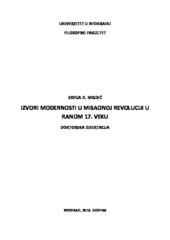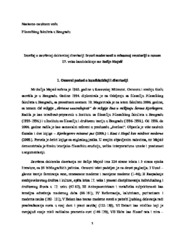Приказ основних података о дисертацији
Izvori modernosti u misaonoj revoluciji u ranom 17. veku
Origins of modernity in intellectual revolution in early 17 century
| dc.contributor.advisor | Govedarica, Milanko | |
| dc.contributor.other | Grubor, Nebojša | |
| dc.contributor.other | Kozomara, Mladen | |
| dc.creator | Mojsić, Sofija D. | |
| dc.date.accessioned | 2016-08-13T10:05:21Z | |
| dc.date.available | 2016-08-13T10:05:21Z | |
| dc.date.available | 2020-07-03T10:03:14Z | |
| dc.date.issued | 2016-05-24 | |
| dc.identifier.uri | http://eteze.bg.ac.rs/application/showtheses?thesesId=3589 | |
| dc.identifier.uri | https://nardus.mpn.gov.rs/handle/123456789/6269 | |
| dc.identifier.uri | https://fedorabg.bg.ac.rs/fedora/get/o:12338/bdef:Content/download | |
| dc.identifier.uri | http://vbs.rs/scripts/cobiss?command=DISPLAY&base=70036&RID=527231127 | |
| dc.description.abstract | Apstrakt U ovom radu se ispituje mogućnost utemeljenja ključnih odrednica modernosti u odlučujućim društveno-ekonomskim, materijalnim dostignućima ranog 17. veka i složenom sklopu reformisanog hrišćanstva i njegovih učinaka, kao i u delima i idejama četiri velika filozofa iz prve polovine 17. veka: Bekona, Dekarta, Hobsa i Paskala. Pojam „modernosti“ se ovde definiše kao umno, teorijsko vođenje prakse, pojava individualizma, sklop građanskih demokratskih političkih ideja i ideala, jedinstveni moderni oblik materijalne produkcije života u vidu kapitalizma, formiranje autonomnog morala i zrele, odrasle, odgovorne, slobodne ličnosti. Od svih bitnih društvenih i duhovnih procesa u prvoj polovini 17. veka kao najznačajniji ističe se matematizacija sveta i uopšte stvaranje moderne matematizovane nauke. Ona je omogućila bitnu promenu doživljaja i odnosa čoveka prema prirodi i svetu uopšte za koje sada važi tako reći samo jedan valjan princip: kontrola i ovladavanje prirodom i svetom uopšte radi lakšeg i ugodnijeg života ljudi. Drugi bitan kompleks je moderna kapitalistička proizvodnja koja je svojim meandriranim putevima u 17. veku ipak uspela da pripremi ekspanziju kapitalizma i industrijsku revoluciju u 18. i 19. veku. Reformisani oblici hrišćanstva kakvi su kalvinizam i puritanizam formulišu specifičnu strategiju unutarsvetovne askeze koja rađa ono što je postalo poznato kao „radna etika“ kao moralno-religioznopolitičku masovnu legitimaciju kapitalizma. Oni su takođe doprineli pobedi prvih građanskih revolucija i naprednih, slobodoumnih, demokratskih političkih ideala i ideologija u 17. veku. Analiza dela pomenutih velikih filozofa iz 17. veka pokazuje da u njihovom delu dominiraju procesi racionalizacije, intelektualizacije i matematizacije sveta i ljudske duše. Oni su ostavili teški beleg na celokupnom ljudskom bivstvujućem koje ostvaruje veliki materijalni napredak po visoku cenu žrtvovanja svoje unutrašnje prirode, čulnosti, telesnosti, sreće i radosti i tako se pretvara u osakaćeni patrljak svog predominantnog instrumentalnog uma. Ipak, ovde se zaključuje da se um mora spasiti isceljujućom kritičkom samorefleksijom i pomirenjem sa spoljnom i unutrašnjom prirodom kojima treba dati još jednu priliku na putu modernizacije čoveka i njegovog sveta. | sr |
| dc.description.abstract | This work explores the possibility of foundation of the crucial determinants of modernity in the decisive social and economic material achievements of the early 17 century and in the complex structure of the Reformed Christianity and its aftermath as well as in the writings and ideas of four great philosophers from the first half of 17 century: Bacon, Descartes, Hobbes and Pascal. The concept of „modernity“ is here defined as rational, theoretical guiding of practice; individualism; the complex of bourgeois democratic political ideas and ideals; the unique modern form of material production of life known as capitalism; forming of autonomous morality and mature adult responsible free personality. Mathematization of the world and in general the creation of the modern mathematized science is here stressed as the most essential social and spiritual process in the first half of 17 century. It enabled the main change of experience and relation of man to nature and world in general which were subjected to only one principle: control and mastery of nature and world in general in order to achieve easier and more comfortable life of men. The second essential complex is modern capitalist production which succeeded indirectly to prepare in 17 century the expansion of capitalism and industrial revolution in 18 and 19 century. The Reformed Christianity like calvinism and puritanism formulated the specific strategy of the so called „innerworldly asceticism“ which became known as the „work ethics“ as moral, religious and political massive legitimation of capitalism. They also contributed to the triumph of the first bourgeois revolutions and progressive liberal democratic political ideals and ideologies in 17 century. The analysis of the writings of the aforementioned seventeenth century philosophers shows that the processes of rationalization, intellectualization and mathematization of the world dominate in them. They left hard mark on the whole human being who achieved the huge material progress at the high price of sacrifice of its inner nature, sensitivity, flesh, happiness and joy and transformed itself in the maimed leftover of its predominant instrumental reason. Yet, it is concluded here that reason must be saved by selfhealing critical selfreflection and reconciliation with the outer and inner nature which should be given another chance on the road of modernization of man and his world. | en |
| dc.format | application/pdf | |
| dc.language | sr | |
| dc.publisher | Универзитет у Београду, Филозофски факултет | sr |
| dc.rights | openAccess | en |
| dc.rights.uri | https://creativecommons.org/licenses/by/4.0/ | |
| dc.source | Универзитет у Београду | sr |
| dc.subject | modernost | sr |
| dc.subject | modernity | en |
| dc.subject | reformation | en |
| dc.subject | rationalisation | en |
| dc.subject | individualism | en |
| dc.subject | bourgeoisie | en |
| dc.subject | mathematization | en |
| dc.subject | democracy | en |
| dc.subject | capitalism | en |
| dc.subject | nature | en |
| dc.subject | selfreflection | en |
| dc.subject | reformacija | sr |
| dc.subject | racionalizacija | sr |
| dc.subject | individualizam | sr |
| dc.subject | građanstvo | sr |
| dc.subject | matematizacija | sr |
| dc.subject | demokratija | sr |
| dc.subject | kapitalizam | sr |
| dc.subject | priroda | sr |
| dc.subject | samorefleksija | sr |
| dc.title | Izvori modernosti u misaonoj revoluciji u ranom 17. veku | sr |
| dc.title | Origins of modernity in intellectual revolution in early 17 century | en |
| dc.type | doctoralThesis | en |
| dc.rights.license | BY | |
| dcterms.abstract | Говедарица, Миланко; Козомара, Младен; Грубор, Небојша; Мојсић, Софија Д.; Извори модерности у мисаоној револуцији у раном 17. веку; Извори модерности у мисаоној револуцији у раном 17. веку; | |
| dc.identifier.fulltext | http://nardus.mpn.gov.rs/bitstream/id/27443/Disertacija4223.pdf | |
| dc.identifier.fulltext | http://nardus.mpn.gov.rs/bitstream/id/27444/Mojsic_Sofija_D.pdf | |
| dc.identifier.fulltext | https://nardus.mpn.gov.rs/bitstream/id/27443/Disertacija4223.pdf | |
| dc.identifier.fulltext | https://nardus.mpn.gov.rs/bitstream/id/27444/Mojsic_Sofija_D.pdf | |
| dc.identifier.rcub | https://hdl.handle.net/21.15107/rcub_nardus_6269 |



